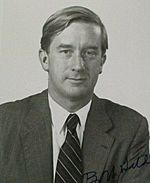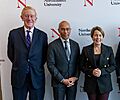Bill Weld facts for kids
Quick facts for kids
Bill Weld
|
|
|---|---|
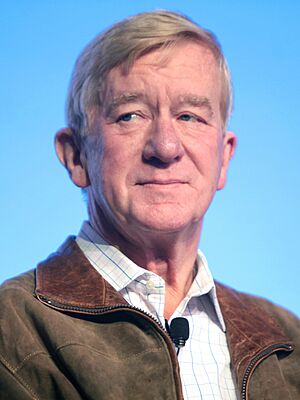
Weld in 2016
|
|
| 68th Governor of Massachusetts | |
| In office January 3, 1991 – July 29, 1997 |
|
| Lieutenant | Paul Cellucci |
| Preceded by | Michael Dukakis |
| Succeeded by | Paul Cellucci |
| United States Assistant Attorney General for the Criminal Division | |
| In office September 15, 1986 – March 29, 1988 |
|
| President | Ronald Reagan |
| Preceded by | Stephen S. Trott |
| Succeeded by | Edward Dennis |
| United States Attorney for the District of Massachusetts | |
| In office November 1, 1981 – September 15, 1986 |
|
| President | Ronald Reagan |
| Preceded by | Edward F. Harrington |
| Succeeded by | Frank L. McNamara Jr. |
| Personal details | |
| Born |
William Floyd Weld
July 31, 1945 Smithtown, New York, U.S. |
| Political party | Republican (before 2016, 2019–present) |
| Other political affiliations |
|
| Spouses |
Susan Roosevelt
(m. 1975; div. 2002)Leslie Marshall
(m. 2003) |
| Children | 5 |
| Relatives | Weld family |
| Education | Harvard University (BA, JD) University College, Oxford |
| Signature | |
William Floyd Weld (born July 31, 1945) is an American lawyer, businessman, and politician. He served as the 68th Governor of Massachusetts from 1991 to 1997.
Weld graduated from Harvard University and started his career as a lawyer. He worked for the U.S. government as a prosecutor, where he became known for fighting corruption. He was elected governor of Massachusetts in 1990 and was reelected in 1994 with a record-breaking number of votes.
Later in his career, Weld ran for other offices, including the U.S. Senate. In 2016, he ran for Vice President of the United States with the Libertarian Party. He also ran for the Republican presidential nomination in 2020.
Contents
Early Life and Education
William Weld was born in Smithtown, New York. His father, David, was an investment banker. His mother, Mary, was a descendant of William Floyd, who signed the U.S. Declaration of Independence. His family has a long history with Harvard University, and two buildings there are named after them.
Weld went to Middlesex School in Concord, Massachusetts. He then studied classics at Harvard College, graduating with highest honors in 1966. He also studied economics at University College, Oxford in England. He earned his law degree from Harvard Law School in 1970.
Early Career as a Lawyer
Working on the Nixon Impeachment Inquiry
Weld's legal career began in 1974 when he worked on the impeachment inquiry staff for the U.S. House Judiciary Committee. This was during the investigation of President Richard Nixon. Weld helped write a report on the constitutional reasons for impeaching a president. One of his coworkers on the staff was a young Hillary Clinton.
U.S. Attorney for Massachusetts
In 1981, President Ronald Reagan appointed Weld as the U.S. Attorney for Massachusetts. In this role, he was the top federal prosecutor for the state. He became known for fighting public corruption and other crimes. His office successfully prosecuted many cases, earning him a national reputation. The Boston Globe newspaper praised his office for its success in winning corruption cases.
Working in the Justice Department
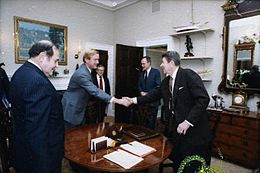
In 1986, President Reagan promoted Weld to lead the Criminal Division of the U.S. Department of Justice in Washington, D.C. He supervised all federal criminal cases, including those from the FBI.
In 1988, Weld resigned from the Justice Department. He did this to protest the actions of Attorney General Edwin Meese. Weld and another top official, Arnold Burns, later testified before Congress about their concerns. This showed Weld was willing to stand up for his principles.
Governor of Massachusetts (1991–1997)
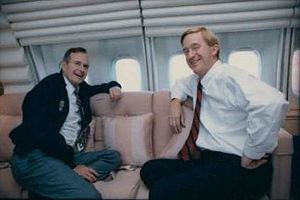
In 1990, Weld ran for Governor of Massachusetts. Even though Massachusetts had many more Democratic voters, Weld's moderate views helped him win. He promised to cut taxes and improve the state's economy. He defeated John Silber and became the first Republican governor of Massachusetts in 16 years.
As governor, Weld was known for being a moderate Republican. This means he was conservative with money but liberal on social issues. He supported lower taxes and less government spending. He also supported gay rights and a woman's right to choose.
Key Actions as Governor
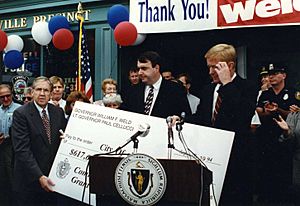
- Economic Policies: Weld's leadership helped improve the business climate in Massachusetts. The state's unemployment rate dropped during his first term.
- Education Reform: He signed the Massachusetts Education Reform Act of 1993. This law created the MCAS standardized test and allowed for the creation of charter schools.
- Social Issues: Weld was a strong supporter of LGBT rights. In 1992, he signed an order recognizing domestic partnerships for same-sex couples. He also signed a law to protect the rights of gay and lesbian students.
- A Fun Moment: In 1996, after signing a bill to protect the environment, he celebrated by jumping fully clothed into the Charles River.
In the 1994 election, Weld was reelected by a huge margin. It was the largest victory in the history of Massachusetts governor races.
Cabinet and Administration
| The Weld Cabinet | ||
|---|---|---|
| OFFICE | NAME | TERM |
| Governor | William Weld | 1991–1997 |
| Lt. Governor | Paul Cellucci | 1991–1997 |
| Secretary of Transportation and Construction | Richard L. Taylor James Kerasiotes |
1991–1992 1992–1997 |
| Secretary of Housing & Community Development | Steven Pierce Mary L. Padula |
1991–1991 1991–1996 |
| Secretary of Environmental Affairs | Susan Tierney Trudy Coxe |
1991–1993 1993–1997 |
| Secretary of Consumer Affairs | Gloria Cordes Larson Priscilla Douglas Nancy Merrick |
1991–1993 1993–1996 1996–1997 |
| Secretary of Health and Human Services | David P. Forsberg Charlie Baker Gerald Whitburn Joseph V. Gallant William D. O'Leary |
1991–1992 1992–1994 1995–1996 1996–1997 1997–1997 |
| Secretary of Elder Affairs | Franklin P. Ollivierre | 1991–1997 |
| Secretary of Labor | Christine Morris | 1991–1996 |
| Secretary of Administration & Finance | Peter Nessen Mark E. Robinson Charlie Baker |
1991–1993 1993–1994 1994–1997 |
| Secretary of Public Safety | James B. Roche Thomas C. Rapone Kathleen O'Toole |
1991–1992 1992–1994 1994–1997 |
| Director of Economic Affairs | Stephen Tocco Gloria Cordes Larson |
1991–1993 1993–1996 |
| Secretary of Education | Piedad Robertson Michael Sentance |
1991–1995 1995–1996 |
Later Political Career
1996 Senate Election
In 1995, Weld decided to run for the U.S. Senate against the incumbent Democrat, John Kerry. The race was one of the most watched in the country. Weld and Kerry were known for being respectful to each other during the campaign. They even agreed to a spending limit and held eight debates. In the end, Kerry won the election.
Ambassador Nomination
In 1997, President Bill Clinton nominated Weld to be the U.S. Ambassador to Mexico. However, the chairman of a key Senate committee, Jesse Helms, refused to hold a hearing for his nomination. Helms disagreed with Weld's moderate views on social issues.
Weld publicly criticized Helms for blocking him. After a six-week battle, Weld withdrew his name from consideration. He resigned as governor to focus on the nomination, saying he wanted to fight for what he believed in.
2016 Vice Presidential Campaign
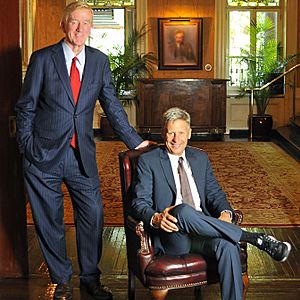
In 2016, Weld left the Republican Party to join the Libertarian Party. He became the vice-presidential running mate for Gary Johnson, the former governor of New Mexico. They were the first presidential ticket since 1948 to have two former governors.
The Johnson/Weld ticket received nearly 4.5 million votes. This was the best result for a Libertarian ticket in history and the highest for any third-party ticket since 1996.
2020 Presidential Campaign
Weld rejoined the Republican Party in 2019 to run for president. He challenged the incumbent president, Donald Trump, for the Republican nomination. Weld said he was concerned about issues like climate change.
He won one delegate in the Iowa caucuses, which was a rare achievement for someone challenging a sitting president from their own party. He ended his campaign in March 2020. Later that year, he endorsed Democrat Joe Biden for president.
Personal Life
Weld married Susan Roosevelt Weld, a great-granddaughter of President Theodore Roosevelt, in 1975. They had five children together. The couple divorced in 2002. Weld is now married to writer Leslie Marshall. They live in Canton, Massachusetts.
Weld is a fan of the band the Grateful Dead and enjoys playing blindfold chess.
Images for kids
-
Weld (left) in 2024 with former Massachusetts Governor Deval Patrick and the incumbent governor Maura Healey
Electoral history
| Party | Candidate | Votes | % | |
|---|---|---|---|---|
| Republican | Donald Trump / Mike Pence | 62,985,153 | 45.9% | |
| Democratic | Hillary Clinton / Tim Kaine | 65,853,677 | 48.0 | |
| Libertarian | Gary Johnson / Bill Weld | 4,489,359 | 3.27 | |
| Green | Jill Stein / Ajamu Baraka | 1,457,288 | 1.1 | |
| Independent | Evan McMullin / Mindy Finn | 732,409 | 0.5 | |
| Independent | Other third-party candidates | 453,896 | 0.3 | |
| Write-in | 1,171,436 | 0.9 | ||
| Total votes | 137,143,218 | 100.0 | ||
| 1996 United States Senate election in Massachusetts | |||||
|---|---|---|---|---|---|
| Party | Candidate | Votes | % | ±% | |
| Democratic | John Kerry (incumbent) | 1,334,345 | 52.7% | ||
| Republican | Bill Weld | 1,142,837 | 45.2% | ||
| Conservative | Susan C. Gallagher | 70,013 | 2.8% | N/A | |
| Natural Law | Robert C. Stowe | 7,176 | 0.3% | N/A | |
| Write-in | 1,515 | 0.1% | |||
| Total votes | 2,555,886 | 100.0% | |||
| Party | Candidate | Votes | % | |
|---|---|---|---|---|
| Republican | Bill Weld (incumbent) | 1,533,390 | 70.9 | |
| Democratic | Mark Roosevelt | 611,650 | 28.3 | |
| Total votes | 2,145,040 | 100.0 | ||
| 1990 Massachusetts gubernatorial election | |||||
|---|---|---|---|---|---|
| Party | Candidate | Votes | % | ±% | |
| Republican | Bill Weld | 1,175,817 | 50.2 | ||
| Democratic | John Silber | 1,099,878 | 46.9 | ||
| Independent | Leonard Umina | 62,703 | 2.7 | – | |
| Independent | Dorothy Stevens (write-in) | 872 | 0.0 | – | |
| Total votes | 2,339,270 | 100.0 | |||
| Party | Candidate | Votes | % | |
|---|---|---|---|---|
| Democratic | Francis X. Bellotti (incumbent) | 1,532,835 | 78.4 | |
| Republican | Bill Weld | 421,417 | 21.6 | |
| Total votes | 2,044,076 | 100.0 | ||
See also
 In Spanish: William Weld para niños
In Spanish: William Weld para niños
 | John T. Biggers |
 | Thomas Blackshear |
 | Mark Bradford |
 | Beverly Buchanan |


